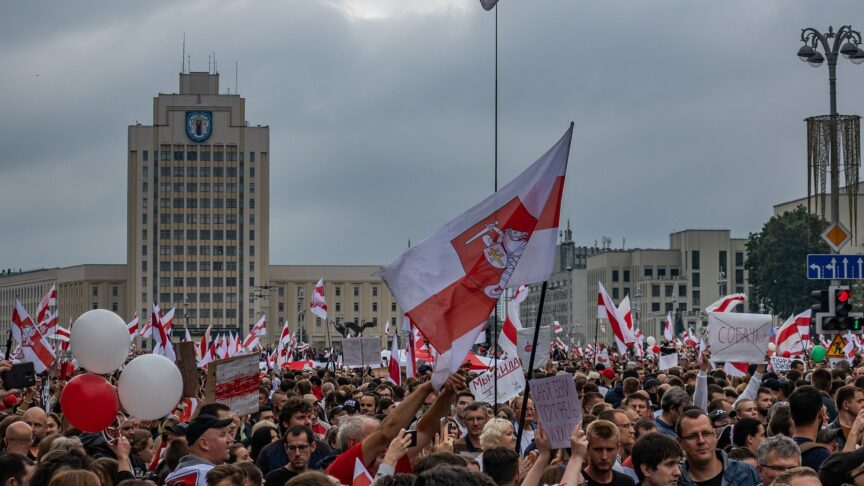The impossible stalemate: How the Belarus face-off could go on and on
Aliaksandr Lukashenka rewrote the rules to keep himself in power. But it did not succeed in 2020 – and the EU will not be able to remain a spectator to Belarus’s problems forever
In 67 AD, the emperor Nero, who believed in his own greatness and omnipotence, wanted to add to his numerous titles and decided to participate in the Olympic Games chariot races. For this, he postponed the date of the games and made changes to the rules. Instead of four horses, as many as ten were harnessed to his team. Nero fell out of the chariot and did not reach the finish line – but he was still proclaimed the winner and an Olympic champion.
In 2020, Aliaksandr Lukashenka, who had previously removed constitutional restrictions on the number of presidential terms, stood again as president of Belarus. His main competitors were not allowed to participate and ended up either in prison or in forced emigration. Despite all evidence to the contrary, Lukashenka was declared the winner, purportedly taking over 80 per cent of the vote.
However, the analogy with Nero’s sports victory is not the only one in relation to the political crisis in Belarus.
The mass protests that swept the country after the election, and in which, according to various estimates, between 10-14 per cent of the total population of Belarus took part, did not end in a quick victory for either of the parties. Each of them played their best opening gambits but failed to achieve the desired result. The country’s leadership does not want to leave, and the people do not want to stop protesting. This has now been going on for more than five months and resembles a double stalemate in chess – in which no player is able to make a move.
Without large-scale repression and police violence, Lukashenka is unable to retain power.
Protesters continue to push for new elections, the release of political prisoners, and an end to repression. Until these requirements are met, they have declared their readiness to protest night and day. Lukashenka, in turn, has demonstratively shown that he is not planning to go anywhere. He continues to throw all who dissent into prison, and publicly encourages violence by the security forces, calling them heroes saving the country.
The security forces act as Lukashenka’s powerful front rank; they are his main support in the country. Without large-scale repression and police violence, he is unable to retain power given widespread agreement in the country that his continued rule is illegitimate. For this reason, purges are taking place in state structures, street protests are brutally suppressed, and more than 32,000 people have already been detained or imprisoned in recent months.
To patch the budget holes in the country’s weak economy, the government has hiked taxes, given local authorities permission to charge additional fees (such as leaving the country by car), and is considering cutting some social benefits.
On the other side of the barricades, the state-led violence means that street actions’ mass character has significantly decreased; however, they continue in various forms. The leaders of the Belarusian opposition, who managed to leave the country, are currently focusing their efforts on splitting the power monolith. To this end, they are collecting evidence about the financial support the regime receives from businessmen close to Lukashenka, and about security agency employees, judges, and officials who have committed malfeasance. Their aim is to have these names entered on the EU and US sanctions lists.
However, neither the steps of the authorities, nor the efforts of the opposition, will lead to radical change in the alignment of forces and victory in the near future.
The state apparatus can be consolidated by fear, the people can be pacified by repression, and economic problems can be solved by raising taxes only for a short period of time. But, over the long haul, all these decisions will only lead to an even more serious deterioration in the quality of public administration, increased discontent in society, and budgetary losses due to capital outflow and diminishing credit opportunities.
The opposition are placing their hopes in international sanctions. But these are unpredictable tools, and, if they are weak or partial, such measures will prove ineffective. Visa restrictions placed on the regime are more symbolic than anything else, and sectoral economic sanctions could go either way – leading either to the regime weakening or even strengthening it. On the one hand, sanctions demonstrate international support for the people of Belarus; on the other, they instil in them a false and dangerous illusion that sanctions alone can solve Belarusians’ problems in the face of an authoritarian regime.
Thus, Belarus now finds itself in a situation where neither side has a move in reserve to defeat its opponent. The rules of chess provide that, when stalemate occurs, the game ends in a draw. But in Belarus, this will not be possible – one side or the other will need to resign.
There are more than two players in this game, however. Regardless of whether Lukashenka remains in power for a few more years or is forced to leave much earlier, the Belarus issue will regularly appear on the EU’s agenda in the coming years. It is not going away – which is the reason why the European Union should set about solving the problem now, rather than having to deal with an upturned chessboard at a later date, with all the picking up of the pieces this will involve.
The European Council on Foreign Relations does not take collective positions. ECFR publications only represent the views of their individual authors.



